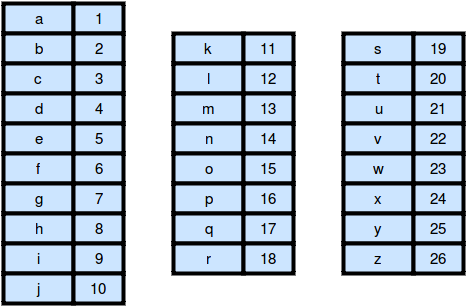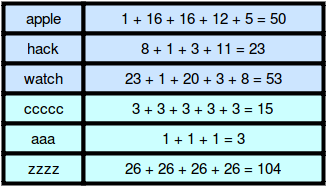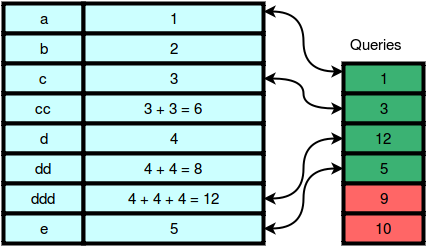Weighted Uniform Strings
A weighted string is a string of lowercase English letters where each letter has a weight. Character weights are to from to as shown below:

The weight of a string is the sum of the weights of its characters. For example:

- A uniform string consists of a single character repeated zero or more times. For example,
cccandaare uniform strings, butbcbandcdare not.
Given a string, , let be the set of weights for all possible uniform contiguous substrings of string . There will be queries to answer where each query consists of a single integer. Create a return array where for each query, the value is Yes if . Otherwise, append No.
Note: The symbol denotes that is an element of set .
Example
.
Working from left to right, weights that exist are:
string weight
a 1
b 2
bb 4
c 3
cc 6
ccc 9
d 4
dd 8
ddd 12
dddd 16
Now for each value in , see if it exists in the possible string weights. The return array is ['Yes', 'No', 'No', 'Yes', 'No'].
Function Description
Complete the weightedUniformStrings function in the editor below.
weightedUniformStrings has the following parameter(s):
- string s: a string
- int queries[n]: an array of integers
Returns
- string[n]: an array of strings that answer the queries
Input Format
The first line contains a string , the original string.
The second line contains an integer , the number of queries.
Each of the next lines contains an integer , the weight of a uniform subtring of that may or may not exist.
Constraints
- will only contain lowercase English letters, ascii[a-z].
Sample Input 0
abccddde
6
1
3
12
5
9
10
Sample Output 0
Yes
Yes
Yes
Yes
No
No
Explanation 0
The weights of every possible uniform substring in the string abccddde are shown below:

We print Yes on the first four lines because the first four queries match weights of uniform substrings of . We print No for the last two queries because there are no uniform substrings in that have those weights.
Note that while de is a substring of that would have a weight of , it is not a uniform substring.
Note that we are only dealing with contiguous substrings. So ccc is not a substring of the string ccxxc.
Sample Input 1
aaabbbbcccddd
5
9
7
8
12
5
Sample Output 1
Yes
No
Yes
Yes
No
solution
Section titled “solution”#include <bits/stdc++.h>
using namespace std;
string ltrim(const string &);string rtrim(const string &);
/* * Complete the 'weightedUniformStrings' function below. * * The function is expected to return a STRING_ARRAY. * The function accepts following parameters: * 1. STRING s * 2. INTEGER_ARRAY queries */
vector<string> weightedUniformStrings(string input, vector<int> queries) { unordered_set<int> weights; int currentWeight = 0; char previousChar = '\0';
for (char currentChar : input) { int charWeight = currentChar - 'a' + 1; if (currentChar == previousChar) { currentWeight += charWeight; } else { currentWeight = charWeight; previousChar = currentChar; } weights.insert(currentWeight); }
vector<string> result; for (int queryWeight : queries) { if (weights.count(queryWeight)) { result.push_back("Yes"); } else { result.push_back("No"); } }
return result;}
int main(){ ofstream fout(getenv("OUTPUT_PATH"));
string s; getline(cin, s);
string queries_count_temp; getline(cin, queries_count_temp);
int queries_count = stoi(ltrim(rtrim(queries_count_temp)));
vector<int> queries(queries_count);
for (int i = 0; i < queries_count; i++) { string queries_item_temp; getline(cin, queries_item_temp);
int queries_item = stoi(ltrim(rtrim(queries_item_temp)));
queries[i] = queries_item; }
vector<string> result = weightedUniformStrings(s, queries);
for (size_t i = 0; i < result.size(); i++) { fout << result[i];
if (i != result.size() - 1) { fout << "\n"; } }
fout << "\n";
fout.close();
return 0;}
string ltrim(const string &str) { string s(str);
s.erase( s.begin(), find_if(s.begin(), s.end(), not1(ptr_fun<int, int>(isspace))) );
return s;}
string rtrim(const string &str) { string s(str);
s.erase( find_if(s.rbegin(), s.rend(), not1(ptr_fun<int, int>(isspace))).base(), s.end() );
return s;}